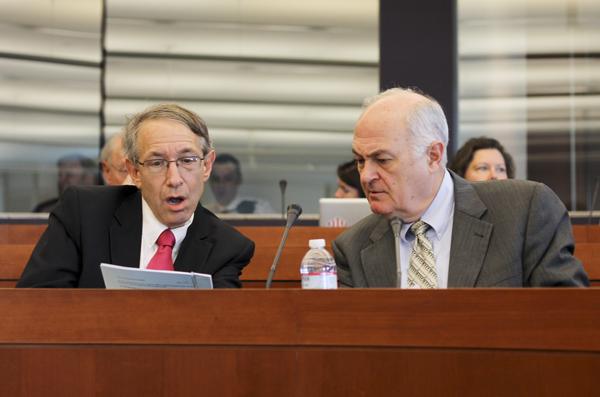The Faculty Senate approved the University’s sexual assault policy Friday after about 18 months of review, vastly extending the deadline for victims to file formal complaints.
The policy quadrupled the time frame in which victims of sexual violence can bring forward a disciplinary case against an alleged perpetrator to two years, a deadline that was set at six months in last fall’s interim policy. Before this year, GW did not specify a statute of limitations, mirroring other universities.
The change came after students lobbied GW’s Deputy Title IX Coordinator Tara Pereira to give victims more time to make formal complaints. She said students’ feedback reinforced the University’s decision to extend the window.
“We do not want to rush anyone through this personal process,” she said. “But most people who want to come forward with a judicial process will do so in two years.”
Engineering professor Charles Garris, who presented the new guidelines Friday to the faculty governance body and top administrators, said the change makes the policy more “user-friendly.”
But the policy is not entirely mainstream. Some universities – like Georgetown, American, New York and Duke – do not set limits on when a student can make a disciplinary case, according to their websites.
The policy allows students who submit complaints against other students to remain anonymous at any stage, but Pereira said in a March interview that victims who fail to disclose their identities could hamstring their case during a hearing. Students must reveal their names if they choose to initiate the hearing process against a faculty or staff member.
The policy, which encompasses sexual assault and other types of harassment, prohibits victims from directly mediating with offenders and gives both accusers and respondents the option to appeal. It also defines sexual violence.
The faculty committee met with Pereira, Vice Provost for Diversity and Inclusion Terri Reed, Vice Provost for Faculty Affairs Dianne Martin, Associate General Counsel Richard Weitzner and Senior Associate Vice President for Safety and Security Darrell Darnell to help review the policy.
Garris said the policy was “not perfect,” and said several members of the review committee were dissatisfied with the wording of certain sections. For example, the final version did not include a provision requiring the University to distribute the policy annually to faculty, staff, students and parents of undergraduates.
Scheherazade Rehman, chair of the senate’s executive committee, said failure to approve the policy Friday would force the Board of Trustees to consider it without faculty input.
Rehman added that the University must have a sexual assault policy in place that is consistent with federal law to receive government grants. GW began revamping its eight-year-old policy last year after receiving the Department of Education’s “Dear Colleague” letter, a strong recommendation for universities across the country to update their sexual assault codes.
“I would not, actually, like to see GW held up as the poster child in D.C. for turning this clock back. The tide has moved on this, and I think saying no to this policy and to the senate resolution will send out a bleak message to the young people on our campus,” Rehman said.
Nearly 20 percent of women who attend college are victims of actual or attempted sexual assault, according to the Department of Education. The Center for Public Integrity found that college students, for personal and social reasons, report sexual assault even less frequently than the general public, with up to 95 percent of incidents going unreported.
The number of sexual assault reports at GW totaled 12 in 2010 and 16 in 2011, according to the Department of Education.
Pereira said she would include the Student Association in the policy implementation process, adding that she thinks the University has fallen short in engaging students with the guidelines.
“Unless [sexual assault] becomes an issue that students really take hold of, administrators will be fighting a battle that can never be won,” she said, adding that she hopes the student lobbyists can help heighten sexual assault awareness on campus.
But members of the Student Association still argue that the deadline to report a sexual assault is not fair to victims. Sen. Nick Gumas, CCAS-U, wrote an open letter two weeks ago that calls for an unlimited reporting window for victims, which was the University’s former policy.
In January, when the University first announced plans to adjust the time frame, Pereira said it opted for the initial limit because victims’ memories are less reliable as time passes, which could impact the strength of their cases.
Gumas also said the administration needs to more clearly define “consent” in the Code of Student Conduct, which is currently defined as a “freely given agreement to have sexual intercouse or engage in other sexual activities.”
But Pereira said the process of changing the code would take too much time, and added that creating an educational guide for the students could help with clarity. Her office has already started making a resource similar to a “Sexual Assault Survivor’s Guide.”
“I absolutely think the guide is a great idea,” Pereira said. “Many people don’t realize they were sexually assaulted until their roommate tells them [they were] or until they confided in their mom about the situation.”
The University is also creating a website called HAVEN, with step-by-step resources for victims and those accused of sexual assault. Pereira said the site would likely launch before Colonial Inauguration in June, helping to create a campus culture that encourages victims of sexual violence to report the crimes.







